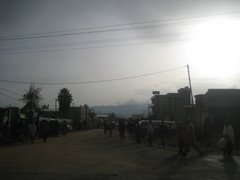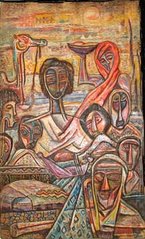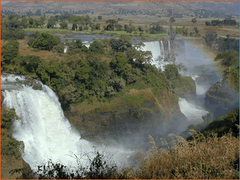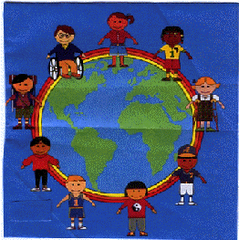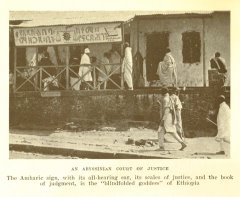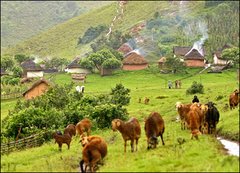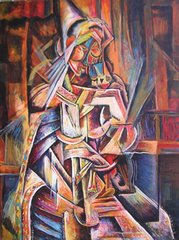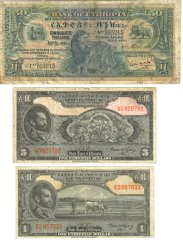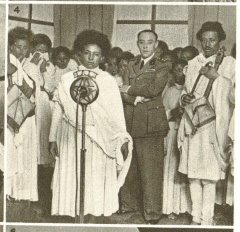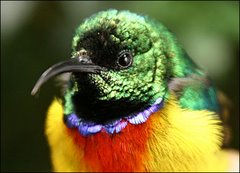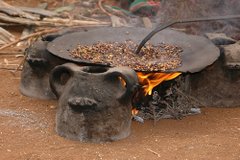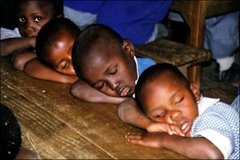Gadaa System: A Traditional Conflict Resolution System Used in Oromia, Ethiopia
Water is so easy to take for granted. You go to the grocery store to buy drinking water, only to be confused over which of the 30 brands of water tastes the best.  It's really hard to imagine someone picking up a gun to battle over water. But in Ethiopia, out of 1,119,683 sq km of land only 2,900 sq km (CIA 2003) is irrigated land. That is - if you round the way we were taught to round in elementary school math - 0% (actually 0.259%). So, most people living outside of the city (which is over 80% of the 76 million population) rely on rainfall and nearby bodies of water for drinking water, baths, washing clothes, feeding their land and animals, etc.
It's really hard to imagine someone picking up a gun to battle over water. But in Ethiopia, out of 1,119,683 sq km of land only 2,900 sq km (CIA 2003) is irrigated land. That is - if you round the way we were taught to round in elementary school math - 0% (actually 0.259%). So, most people living outside of the city (which is over 80% of the 76 million population) rely on rainfall and nearby bodies of water for drinking water, baths, washing clothes, feeding their land and animals, etc.  This is a picture of a Boran woman (from the Borana zone of the Oromia State in Ethiopia). The Boran people rely on pastoralism over farming because of the ecological conditions of the area.
This is a picture of a Boran woman (from the Borana zone of the Oromia State in Ethiopia). The Boran people rely on pastoralism over farming because of the ecological conditions of the area.  Pastoralism (def.) is "the breeding and rearing of animals" (Geographical dictionary). "It also contains a mobile element, moving the herds in search of fresh pasture and water (Wikipedia)." So, because water and pasture is limited, especially in extreme situations (dry season/polluted water), a system of law and conflict resolution has been used for decades.
Pastoralism (def.) is "the breeding and rearing of animals" (Geographical dictionary). "It also contains a mobile element, moving the herds in search of fresh pasture and water (Wikipedia)." So, because water and pasture is limited, especially in extreme situations (dry season/polluted water), a system of law and conflict resolution has been used for decades.
The Gadaa System divides the men in the community into 5 main age groups in which each group has a role to play in maintaining the flocks, the water, the land and the peace (there are additional groups but they play a more symbolic role:
1. FOOLLEE (ages 9-16) - duty is to look after small stock around their area.
2. QONDAALA (ages 17-24) - duty is to take livestock away from their area and begin drawing water from wells.
3. KUUSAA (ages 25-32) - duty is politically significant; nucleus of Gadaa leaders emerge.
4. RAABAA DOORII (ages 33-40) - duty is an extension of Kuusaa grade; prepare for the assumption of full authority; important military services; conducts raids; protects Boran land and resources; men allowed to marry at this stage.
5. GADAA (LUBA) (ages 41-48) - duty is most politically active; most important of all stages; assumes power/office; visit all Borana regions, judge on serious disputes; this stage is marked by a leadership ceremony.
Those over the age 48 are considered the YUBAA; they are the old, wise men who take on an advisory role. Any boy under the age of 9 has only a symbolic role as a mediator between God and humans. Then there is the ABBAA GADAA who is the one leader of Gadaa; he is like the president of Boran. He is called to judge when there is conflict between area within the Borana zone. If there is a conflict between ethnic groups, then the Abbaa Gadaa will be called to make peace.
A few Customary Laws:
1. During wet seasons, only open water sources (rivers, national ponds, ponds) are used and wells are closed.
2. During dry seasons, herds are moved to ponds farther away and traditional wells are re-opened.
3. During the really dry seasons, when water is scarce, drinking frequency of cattle is gradually reduced to once a day, then to once every two days, and then once every three days.
The men in the RAABAA DOORII age group watch to make sure these laws are upheld. The most highly protected sources of water are hand-dug shallow ponds and wells.
Customary Law - traditional management of resources - are in danger of becoming inferior and almost insignificant in many areas. Central government and development projects are using the force of power to override customary law and make their own judgments on water and land use. Sometimes even taking land and bodies of water for their own projects; thereby, decreasing resources for the inhabitants and increasing competition for the limited resources. Industry pollutes the natural bodies of water, further frustrating resources for the rural people.
What's the solution to this problem? Traditional conflict resolution systems are not sufficient alone as rural societies are no longer pure of foreign influence - government, NGO development projects, commercial production and industry. So, how do we eliminate the need of conflict and guns?
(Source: http://www.nri.org/waterlaw/AWLworkshop/DESALEGN-CE.pdf)
